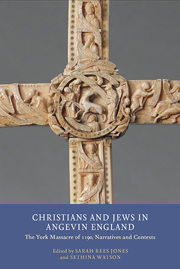Book contents
- Frontmatter
- Contents
- List of Illustrations
- Contributors
- Editor's Preface and Acknowledgments
- Abbreviations
- Introduction: The Moment and Memory of the York Massacre of 1190
- Part I The Events of March 1190
- Part II Jews among Christians in Medieval England
- 6 Faith, Fealty and Jewish ‘infideles’ in Twelfth-Century England
- 7 The ‘Archa’ System and its Legacy after 1194
- 8 Making Agreements, with or without Jews, in Medieval England and Normandy
- 9 An Ave Maria in Hebrew: the Transmission of Hebrew Learning from Jewish to Christian Scholars in Medieval England
- 10 The Talmudic Community of Thirteenth-Century England
- 11 Notions of Jewish Service in Twelfth- and Thirteenth-Century England
- Part III Representations
- Afterword: Violence, Memory and the Traumatic Middle Ages
- Bibliography
- Index
- York Medieval Press: Publications
8 - Making Agreements, with or without Jews, in Medieval England and Normandy
from Part II - Jews among Christians in Medieval England
Published online by Cambridge University Press: 05 May 2013
- Frontmatter
- Contents
- List of Illustrations
- Contributors
- Editor's Preface and Acknowledgments
- Abbreviations
- Introduction: The Moment and Memory of the York Massacre of 1190
- Part I The Events of March 1190
- Part II Jews among Christians in Medieval England
- 6 Faith, Fealty and Jewish ‘infideles’ in Twelfth-Century England
- 7 The ‘Archa’ System and its Legacy after 1194
- 8 Making Agreements, with or without Jews, in Medieval England and Normandy
- 9 An Ave Maria in Hebrew: the Transmission of Hebrew Learning from Jewish to Christian Scholars in Medieval England
- 10 The Talmudic Community of Thirteenth-Century England
- 11 Notions of Jewish Service in Twelfth- and Thirteenth-Century England
- Part III Representations
- Afterword: Violence, Memory and the Traumatic Middle Ages
- Bibliography
- Index
- York Medieval Press: Publications
Summary
The abbey of Flaxley, or Dene, in Gloucestershire, was a small Cistercian house, founded between 1148 and 1154 by the earl of Hereford, on the exact place where his father had died while hunting. Its historian would be short on records: a handful of charters, a few references in royal records, and one cartulary, written in the early thirteenth century, peculiar in its form. It is a roll, measuring 0.18 by 6.3 metres, recording ninety-seven items. This document provides a list of books preserved in the abbey's library, and it has been well studied.
The first student of the roll was Sir Thomas Phillips, who described it to the Royal Society of Literature, transcribed it and published a few charters. The cartulary was later edited by A. Crawley-Boevey, whose family had bought the remains of the abbey, from Phillips's transcripts. The original roll seemed to have disappeared at the time, but it was rediscovered in Phillips's papers and eventually acquired by the British Museum. It is now kept at the British Library under the shelfmark Additional Manuscript 49996.
- Type
- Chapter
- Information
- Christians and Jews in Angevin EnglandThe York Massacre of 1190, Narratives and Contexts, pp. 163 - 173Publisher: Boydell & BrewerPrint publication year: 2013



